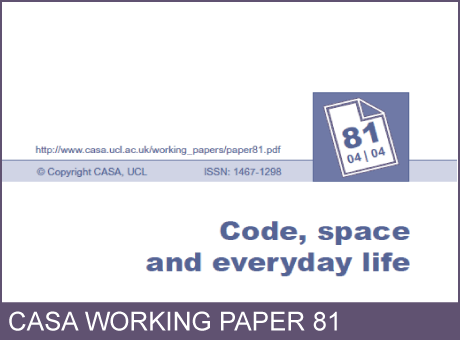CASA Working Paper 81

1 April 2004
Code, space and everyday life
In this paper we examine the role of code (software) in the spatial formation of collective life. Taking the view that human life and coded technology are folded into one another, we theorise space as ontogenesis. Space, we posit, is constantly being bought into being through a process of transduction - the constant making anew of a domain in reiterative and transformative practices - as an incomplete solution to a relational problem. The relational problem we examine is the ongoing encounter between individuals and environment where the solution, to a greater or lesser extent, is code. Code, we posit, is diversely embedded in collectives as coded objects, coded infrastructure, coded processes and coded assemblages.
These objects, infrastructure, processes and assemblages possess technicity, that is, unfolding or evolutive power to make things happen; the ability to mediate, supplement, augment, monitor, regulate, operate, facilitate, produce collective life. We contend that when the technicity of code is operationalised it transduces one of three forms of hybrid spatial formations: code/space, coded space and backgrounded coded space. These formations are contingent, relational, extensible and scaleless, often stretched out across networks of greater or shorter length. We demonstrate the coded transduction of space through three vignettes - each a day in the life of three people living in London, UK, tracing the technical mediation of their interactions, transactions and mobilities. We then discuss how code becomes the relational solution to five different classes of problems - domestic living, travelling, working, communicating, and consuming.
This working paper is available as a PDF. The file size is 288KB.
Authors: Martin Dodge, Rob Kitchin
Publication Date: 1/4/2004
 Close
Close

